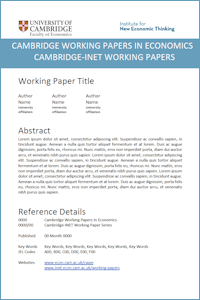
Choi, S., Goyal, S. and Moisan, F.
Brokerage Rents and Intermediation Networks
WP Number: 2002
Abstract: This paper provides experimental evidence on the economic determinants of intermediation networks by considering two pricing rules – respectively criticality and betweenness – and three group sizes of subjects – 10, 50 and 100 subjects. We find that when brokerage benefits accrue only to traders who lie on all paths of intermediation, stable networks involve interconnected cycles, and trading path lengths grow while linking and payoff inequality remain modest as the number of traders grows. By contrast, when brokerage benefits are equally distributed among traders on the shortest paths, stable networks contain a few hubs that provide the vast majority of links, and trading path lengths remain unchanged while linking and payoff inequality explode as the number of traders grows.
Keywords: Brokerage, Experiment, Network formation
JEL Codes: C92 D83 D85 Z13
Author links: Sanjeev Goyal
Open Access Link: 10.17863/CAM.93370
Keynes Fund Project(s):
Experiments on Financial Networks (JHLB)
Experiments on 'Networked Markets' (JHLR)
